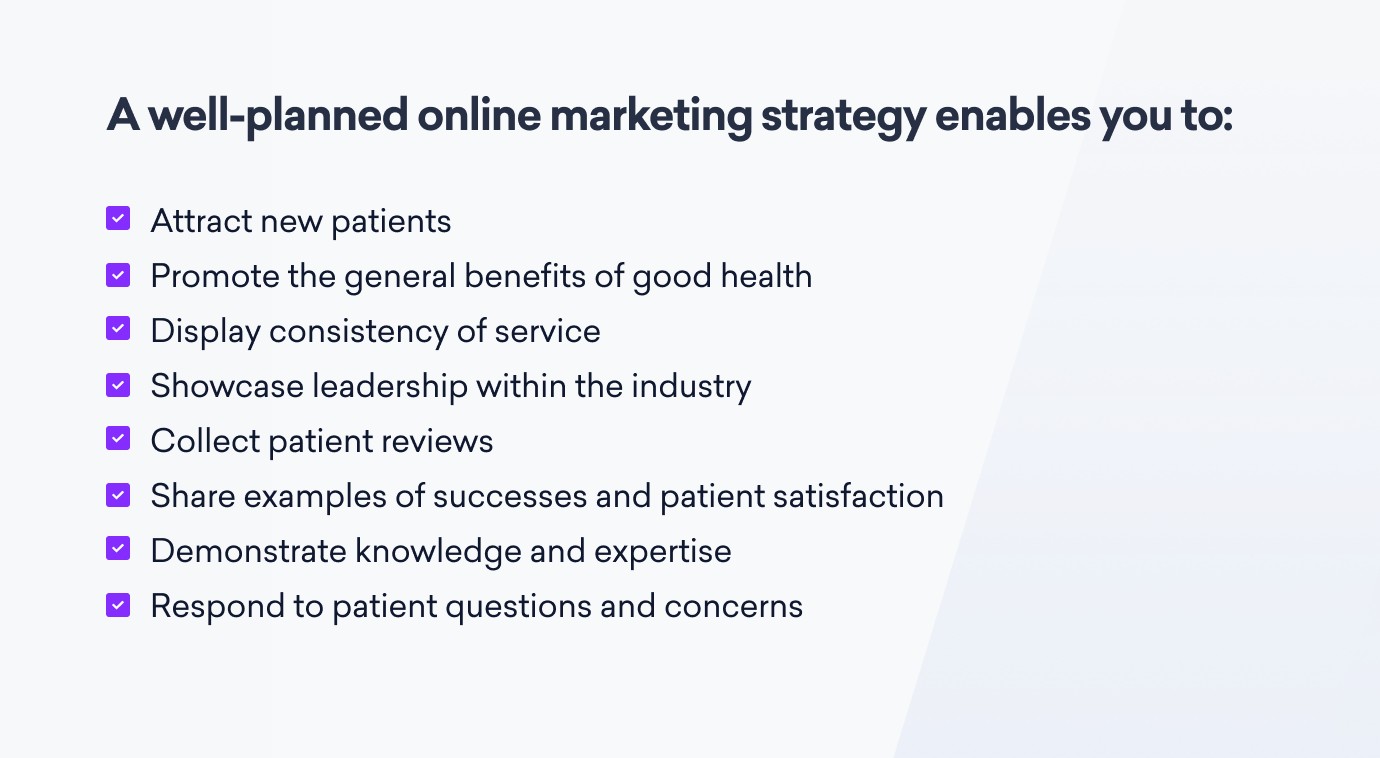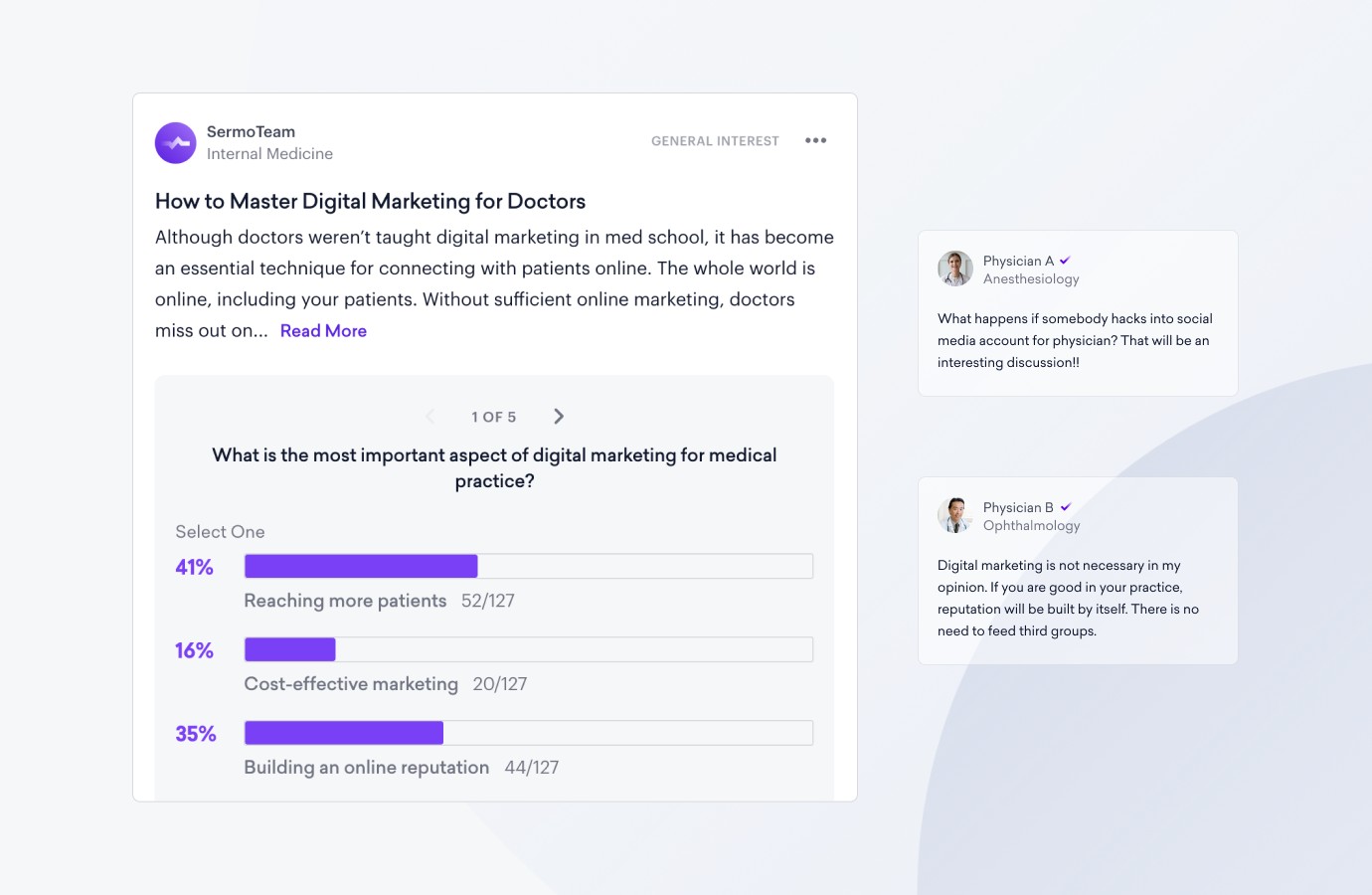
A course on digital marketing for doctors likely wasn’t part of your medical degree. Yet, without sufficient online marketing, doctors miss out on connecting with patients and lose valuable revenue streams to competitors. Plus, maintaining a digital marketing strategy for your practice allows you to efficiently and effectively take control of online reputation management.
The online world of digital marketing can feel overwhelming at first, especially when you have so many other responsibilities as a doctor. Digital marketing is, however, crucial to your success as a physician. Review this comprehensive guide to online marketing for doctors’ offices for the tips you need to succeed.
The importance of digital marketing for medical practices
Physician digital marketing offers an opportunity to promote your services and practice online, often at a minimal cost. The goal of online marketing for doctors is to bring in new patients by creating a professional image that builds trust, breaks the stigma and stress of doctor visits, and simultaneously bolsters your reputation and industry standing.

In a Sermo survey of medical professionals, 38% considered digital marketing to be important for reaching more patients, and 36% said it was integral to building their online reputation.
Online marketing for doctors’ offices: 8 tips
For most practitioners, web marketing is a daunting prospect. After all, you’re a physician, not a website guru or social media expert. There are multiple channels, review sites, and business listings you can utilize, and many strategies that involve your website and in-house content marketing practices as well.
So, where to start? If you’re going to spend time, money, and resources on digital marketing for doctors, you want to know it will pay off. Here are our expert tips for physician marketing success.

1. Define your Audience
The first priority is establishing your market. Digital marketing for medical practices should be targeted. Many doctors fall into the trap of casting their net as wide as possible and hoping for the best. However, this is rarely a fruitful strategy.
Defining your audience helps you create the right content and select the correct communication channels. For example, pediatricians should look at building relationships with obstetricians to strengthen referral networks and focus on digital marketing channels that appeal to parent and family groups. On the other hand, Geriatricians would be better concentrating relationship-building efforts on family doctors and nursing facilities while using social media channels that appeal to an older demographic.
2. Be active on social media
Social media can directly influence patient decisions when selecting a specific provider or seeking a second opinion. You can also open channels of communication with your patients via social media. In fact, in a recent Sermo survey, 12% of respondents stated that they gained patient insights from their digital marketing efforts.
So even if using social media feels complex or unnecessary, it’s a core component of digital marketing for doctors. 56% of surveyed doctors agreed that the biggest benefit of using social media was increased visibility, while 18% of respondents reported using social media to market themselves and their practices.. Which channels you use will depend on your target audience. For example, 71% of Instagram users are under 35, whereas 72% of 50- 64-year-olds use Facebook. Having active profiles on relevant channels drives patient engagement and attracts more new patients, which means your practice also grows.
Still need convincing? Check out these social media statistics:
- 70% of the US population has active social media accounts.
- 80% of internet users look for health information on social media.
- 60% of patients say they trust doctors’ posts on social media.
- 41% of patients use social media to decide on their health care providers.
- 40% of patients say facts found through social media affect how they deal with treatments.
3. Focus on local business
When developing strategies for online marketing, doctors should concentrate on their local area. Patients typically choose doctors in a nearby location rather than traveling long distances. This is confirmed by Google consumer insights, which report a 900%+ increase in “near me tonight/today” searches over a two-year period.
One of the best ways to capitalize on local search is to set up a Google Business Profile. This tool is completely free and helps patients more easily find your practice. You can personalize your Business Profile with photos, offers, hours, and more. Additionally, you can boost your local SEO and develop web pages and articles with location-based keywords. For example, “best cardiologist in San Francisco,” “pediatric services in Austin,” or “cosmetic surgery in Tampa.” These are known as long-tail keywords and will significantly increase your local reach.

4. Join professional networks
LinkedIn is the internet’s largest professional network and an excellent place to start your physician digital marketing efforts by connecting with other doctors. Physician social networking sites like Sermo provide a dedicated space for healthcare professionals to connect with peers and enable global collaboration on important matters in the industry. In fact, 19% of our members reported using social media for community engagement and sharing important medical information. Professional networking is about so much more than collecting names and acquaintances within your industry, it’s about sharing insights and knowledge with your peers.
5. Optimize your website
The way your website looks and how easy it is to navigate are essential components of your online presence. So making yours visually appealing and easy to use is a no-brainer if you want to avoid losing out on patient conversions. In a Sermo survey, 26% of doctors said their business website was their most influential online presence. However, with just a couple of tweaks to to account for technical considerations, it’s possible to get ever more reach and benefits:
- Is your site mobile-friendly? If your website isn’t mobile-friendly, it won’t appear on search engine results, and your organic traffic will plummet. Research shows that 61% of consumers are more likely to contact local businesses with mobile-friendly sites. So this is a top priority.
- Is your website SEO optimized? Updating your web copy with relevant keywords, ensuring metadata and alt tags are present and correct, including sufficient internal and external links, and setting a focus key phrase for each page will improve your Google ranking. 39% of doctors in our survey classed Google as the most influential factor in their online presence — which just goes to show how successful you can be if you spend time on building a solid SEO strategy.
6. Generate patient reviews
Controlling the narrative is a key part of online reputation management for doctors. Research shows that up to 90% of patients use online reviews to evaluate doctors, and 75% will only consider doctors with a rating of 4 stars or higher.
You can ask for reviews on your social media channels and Google My Business profile, but also on external sites, including:
- Yelp
- ZocDocs
- WebMD
- RateMDs
- Healthgrades
7. Utilize content marketing
Understanding complex medical terminology, processes, and procedures can be intimidating for patients. Demonstrating your knowledge and expertise through email marketing, blog articles, and webinars are fantastic ways to build patient trust and confidence.
Use your content to answer common questions and share helpful information. By weaving in plenty of relevant keywords, you’ll simultaneously improve your Google ranking and further increase your online visibility. Although it takes a little extra planning, try to incorporate videos where possible, because video marketers get up to 66% more qualified leads.
8. Invest in paid advertising
Have a dedicated budget for paid advertising on Google, Facebook, Instagram and other popular online destinations. In other words, you need to advertise where your target audience spends their time. Websites that pay for ads appear at the top of Google search results, making conversions more likely. Plus, by targeting ads based on age, interests, behaviors, geography, and specific demographics, you can ensure you reach the patients who are likely to be the best fit for your practice.
9. Best online marketing tips for doctors
Now you know what to focus on, it’s time to safeguard your digital marketing plan by reviewing some best practices for online activity and social media use. When implementing digital marketing for doctors, follow these tips.
- Be Compliant – The Hippocratic Oath still applies in the online realm. Keep patient descriptions respectful, and avoid referencing specific cases without explicit consent, even if you omit the patient’s name.
- Be Professional – Professionalism is crucial in the medical field, especially online. For example, when you respond to online reviews, listen and empathize with your patients.
- Be Accurate – Doctors have a professional responsibility to ensure the accuracy of the content they create and share. Only include links to authoritative sources, and if you can’t verify a fact or statistic, leave it out.
- Be Honest – To avoid conflicts of interest and complaints, be upfront about marketing partnerships whenever you are paid to endorse a product, drug, or therapy.
- Be Selective – Set clear boundaries on who you follow/friend when engaging on social media.
Ask for Help – If in doubt, reach out for support. Research shows that 54% of patients are comfortable with medical providers seeking advice from online communities. Sermo’s physician networking platform is an ideal place to ask questions and gather insights. Many members have their own practice and can give first-hand advice about how they marketed their practice online.
In fact, one third of doctors in our online marketing survey said they had tips to share based on strategies that had already worked for their practice.















